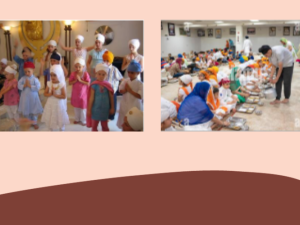Spirituality refers to a sense of connection to something greater than oneself. It is often associated with religious or philosophical beliefs but can also be experienced in a secular context. Spiritual experiences can involve:
- A feeling of inner peace.
- A sense of interconnectedness with others and the world.
- A recognition of one's purpose and meaning in life.
Though spirituality is not necessarily tied to any specific religion or belief system, some people may find spirituality through organized religion. In contrast, others may find it through personal exploration and connection to the natural world or other means.
However, spirituality is a personal and individual journey that can take many forms. The key is to remain open and receptive to the experiences and practices that resonate with you and to approach your spiritual journey with curiosity, compassion, and a willingness to learn and grow.
Hereafter, based on Gurbani, as enshrined in Sri Guru Granth Sahib (SGGS) [1-2], some standard practices that can facilitate spiritual growth are outlined:
- Meditation: Meditation involves focusing the mind on a specific object or idea and can help to quiet the mind and bring about a sense of inner peace. Guru Arjan Dev proclaims the importance of meditation in one's life as:
Jis simraṯ sukẖ ho▫e gẖaṇā ḏukẖ ḏaraḏ na mūle ho▫e.
Remembering Him in meditation, a profound peace is obtained. Pain and suffering will not touch you at all. (M. 5, p. 44)
- Prayer: Prayer is a form of communication with a higher power or divine force and can help to deepen one's sense of connection and purpose. Guru Arjan Dev emphasizes the significance of prayer as:
Āpe jāṇai kare āp āpe āṇai rās. Ŧisai agai nānkā kẖali▫e kīcẖai arḏās.
He Himself knows, acts, and does it right. Nanak says, so, stand before Him and offer your prayers. (M. 2, p. 1093)
Āp cẖẖod benṯī karahu.
Renounce your selfishness and conceit and offer your prayers (to God). (M. 5, p. 295)
- Mindfulness: Mindfulness involves being present now and paying attention to one's thoughts and feelings without judgment or distraction. Guru Ram Das urges us to be mindful of God's presence in our lives as:
Apne parabẖ si▫o hohu sāvḏẖān.
Be always mindful of your God. (M. 5, p. 176)
Ih sansār sabẖ āvaṇ jāṇā man mūrakẖ cẖeṯ ajāṇā.
This whole world is engrossed in the cycle of birth and death. O my foolish and ignorant mind, be mindful of the Lord. (M. 4, p. 607)
- Self-reflection: Reflecting on one's beliefs, values, and experiences can help deepen one's understanding of oneself and the world. Bhagat Kabir, a saint-poet of Sri Guru Granth Sahib, in his hymns, urges us to self-reflect as:
Apnai bīcẖār asvārī kījai. Sahj kai pāvṛai pag ḏẖar lījai.
Make self-reflection your mount and place your feet in the stirrups of intuitive poise. (Bhagat Kabir, p. 329)
- Gratitude: Practicing gratitude by focusing on what one is thankful for can help cultivate positivity and appreciation for the blessings in one's life. Guru Ram Das emphasizes the importance of being grateful in one's life as:
Har har kirpā karī jagḏīsar ḏurmaṯ ḏūjā bẖā▫o ga▫i▫o sabẖ jẖāk.
With God's grace, my evil-mindedness, love of duality and sense of alienation are totally gone. I am grateful to the Lord of the Universe. (M. 4, p. 1295)
- Service: Serving others through acts of kindness and generosity can help to cultivate a sense of gratitude, connection and purpose. It can also help to develop empathy and compassion. Sikh Gurus [3-7] proclaim that one obtains eternal peace and honour through selfless service.
Sevā ṯe saḏā sukẖ pā▫i▫ā gurmukẖ sahj samāvaṇi▫ā.
Through selfless service, eternal peace is obtained. The Gurmukh is absorbed in intuitive peace. (M. 3, p. 125)
Āp gavā▫e sevā kare ṯā kicẖẖ pā▫e mān.
He shall be honoured if he eliminates his self-conceit and then performs service. (M. 2, p. 474)
- Nature: Spending time in nature can help to deepen one's sense of connection to the world and foster a sense of awe and wonder. Gurbani emphasizes the incredible nature of God's creation and encourages us to enjoy it and be grateful for the wonders of our lives. It states:
Bisam bẖa▫e bismāḏ ḏekẖ kuḏraṯ ṯerī▫ā.
I am wonderstruck beholding the wonder of Your Almighty Creative Power. (M. 5, p. 521)
vekẖ vidāṇ rahi▫ā vismāḏ.
Beholding His wonders, I am wonderstruck. (M. 1, p. 464)
- Community: Connecting with others with similar beliefs and values can provide support, validation, and belonging. Guru Arjan Dev advises us to keep the company of wise and holy persons, which leads to many virtues in one's life. He says:
Sanṯā sangaṯ pā▫ī▫ai.
Join the Society of the Saints (wise and holy persons). (M. 5, p. 132)
Ŧẖāʼndẖ parī sanṯėh sang basi▫ā.
One who dwells in the Society of the Saints finds perfect peace. (M. 5, p. 256)
Karam ḏẖaram ṯaṯ gi▫ān sanṯā sang ho▫e.
The karma of good deeds, the righteousness of Dharma and the essence of spiritual wisdom are obtained in the Society of the Saints. (M. 5, p. 521)
- Creativity: Engaging in creative pursuits, such as art, music, or writing, can help to express and connect with one's inner self and foster a sense of purpose. Guru Nanak emphasizes the importance of music, learning, virtues and Naad in his hymns as:
Iknā nāḏ na beḏ na gī▫a ras ras kas na jāṇanṯ. Iknā suḏẖ na buḏẖ na akal sar akẖar kā bẖe▫o na lāhanṯ. Nānak se nar asal kẖar jė bin guṇ garab karanṯ.
Some do not understand Sound-current (Naad) or the Vedas, music, virtue or vice. Some are not blessed with understanding, intelligence, or sublime intellect; they do not grasp the mystery of God's Word. O Nanak, they are donkeys; they are very proud of themselves but have no virtues. (M. 1, p. 1246)
Ḏẖun mėh ḏẖi▫ān ḏẖi▫ān mėh jāni▫ā gurmukẖ akath kahānī.
Meditation is in music, and knowledge is in contemplation. Become Gurmukh and speak the Unspoken Speech. (M. 1, p. 879)
In addition, some people may find that spiritual growth is facilitated by:
- Forgiveness: Letting go of resentments and practicing forgiveness can help to cultivate inner peace and reduce stress and anxiety. Bhagat Kabir proclaims to imbibe the virtue of forgiveness in one's life. He asserts that the virtue of forgiveness leads to godliness.
Ḏubiḏẖā met kẖimā gėh rahhu. Karam ḏẖaram kī sūl na sahhu.
Erase your duality and hold tight to forgiveness, and you will not have to endure the torture of karma or religious rituals. (Bhagat Kabir, p. 343)
Jahā lobẖ ṯah kāl hai jahā kẖimā ṯah āp.
Where there is greed, there is death. Where there is forgiveness, there is God Himself. (Bhagat Kabir, p. 1372)
- Reading and studying: Reading and studying spiritual texts and teachings can provide inspiration, guidance, and support in one's spiritual journey. Guru Nanak urges us to obtain spiritual knowledge. He proclaims:
Gur parsādī viḏi▫ā vīcẖārai paṛ paṛ pāvai mān.
By Guru's Grace, contemplate spiritual knowledge; read and study it, and you shall be honoured. (M. 1, p. 1329)
Nānak musai gi▫ān vihūṇī kẖā▫e ga▫i▫ā jamkāl.
Nanak says that without divine knowledge, one is plundered and devoured by worldly desires, leading to spiritual death. (M.1, p. 465)
- Silence: Taking time for silence and solitude can provide an opportunity to reflect, connect with one's inner self, and deepen one's spiritual practice. Gurbani encourages us to silence the ego and desires for our progress on the spiritual path. It states:
Sunn gufā mėh āsaṇ baisaṇ kalap bibarjiṯ panthā.
In the cave of silence, dwell in your Yogic posture; let the subjugation of desire be your spiritual path. (Bhagat Kabir, p. 334)
Ha▫umai vicẖahu ṯẖāk rahā▫e.
One must silence the ego within. (M. 3, p. 665)
It is important to note that spirituality is not a one-size-fits-all concept, and what works for one person may not work for another. The key is to approach spirituality with an open mind and heart and to be willing to explore and experiment with different practices and techniques until you find what resonates with you.
Ultimately, spirituality is a personal and individual experience, and the path to obtaining it will vary from person to person. Exploring different practices and finding what works best for you in your journey toward spiritual growth is essential.
--------------------------------------------------------------------------------------------------------
References
- Sri Guru Granth Sahib, (SGGS), 1983 (Reprint), S.G.P.C., Amritsar, p 1-1430.
- Khalsa, S.S. English translation of SGGS https://www.srigranth.org/servlet/gurbani.gurbani?Action=Page&Param=1&h=0
- Singh, D. P., Science and Sikhism: Conflict or Coherence. 2018. Singh Brothers, Amritsar, India
- Singh, D. P., A Path to Truthful Living (Part-I), The Sikh Review, 67/1 (Jan. 2019) 25-32.
- Singh, D. P., A Path to Truthful Living (Part-II), The Sikh Review, 67/2 (Feb. 2019) 19-30.
- Singh, D. P., Universal Relevance of Guru Nanak’s Teachings, (Part-I), The Sikh Review, 67/11, (Nov. 2019). 15-21.
- Singh, D.P., Universal Relevance of Guru Nanak’s Teachings, (Part -II), The Sikh Review, 67/12 (Dec. 2019) 19-30.





